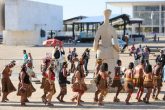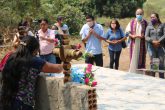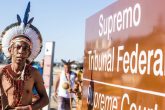Report no 912: Bishops discuss impacts of Belo Monte at General Assembly
The bishops participating in the 48th General Assembly of the CNBB in Brasilia discussed the impacts that the construction of the hydroelectric plant of Belo Monte would bring to the peoples of the region of Volta Grande do Xingu, Pará. The assembly began on Tuesday (4) and continues until May 13.
During the presentation on the social situation of the country, a researcher from the Catholic University of Brasília (UCB), Daniel Seidel, provided a brief history of the struggles and contradictions involving the construction of the plant, as well as the impacts that this work will bring to approximately 30 thousand residents of the region.
According to Seidel, the extremely negative experiences such as the hydroelectric plant of Balbina, in Amazonas, rendered unviable, including morally, the continuation of this and of other projects of the Brazilian electric sector in the 1990s, when the indigenous and environmental movement succeeded in banning initiation of the work.
Adjunct Secretary of the Indigenous Missionary Council (CIMI), Saulo Feitosa, adds: "If we take as an example the transamazonian highway and the UHE Balbina (hydroelectric) using the same logic of the indispensability argument applied to Belo Monte today, we see that they were responsible for the destruction of human lives and a large part of Amazonian biodiversity".
The fight is just beginning
On this occasion Dom Erwin Kräutler, bishop of the Xingu Prelature and president of CIMI, reaffirmed his position in the fight against the dam, declaring that the legal battle over Belo Monte is just beginning. Don Erwin made reference to the auction to choose the consortium responsible for construction, which took place on April 20, despite protests from several national and international organizations and a number of Court ordered injunctions.
According to the CIMI president, the injunctions that were struck down in order to make the auction possible, had as primordial argument Article 176, paragraph 1, of the Federal Constitution, which stipulates that the utilization of water resources in indigenous areas, requires specific legislation. This legislation does not yet exist. "Congress has never addressed this. We understand that the auction and process itself for the dam, by [virtue of] this element, is corrupt at its root. It is unconstitutional because indigenous peoples were not heard", he stated.
Since the first studies for the construction of Belo Monte, which date from the early 1980s, Kräutler has stood against the proposal for the way it was conducted, without hearing the primary stakeholders, in this case the thousands of indigenous and riverine families who would be affected. Only four of the 27 anticipated public hearings occurred, when not even half of these people were heard.
"I attempted several times to ask the president of IBAMA why they did not conduct the other 23 hearings. I never obtained answers. Those that did occur were conducted in an authoritarian manner, where not even the Ministério Publico Federal (MPF-federal prosecutors) could participate. The government said it would not force the Belo Monte dam down our throats, but that is precisely what is being done. The indigenous and riverine peoples received only the message that the Xingu dam would be built in the region. They were never informed about the immense unpredictable and irreversible consequences the project will bring", said Dom Erwin.
Not hearing from the indigenous peoples who would be affected by Belo Monte is a flagrant breach of Convention 169 of the International Labour Organisation (ILO). The document states that indigenous peoples are assured the right to be heard regarding the existence of projects that directly affect their way of life, customs, cultural expressions and their lands.
"The consultations carried out in the application of this Convention shall be undertaken, in good faith and in a form appropriate to the circumstances, with the objective of achieving agreement or consent to the proposed measures", set forth in Article 6, Paragraph 2 of Convention 169. The document further observes that indigenous and tribal peoples have the right to choose their own priorities in development processes, insofar as these affect their own social, economic and cultural development.
The Archbishop of Mariana and president of the CNBB, Dom Geraldo Lyrio Rocha, and Secretary General of the CNBB, Dom Dimas Lara Barbosa, share the same opinion as Kräutler. For them the work is a concern because it does not take into consideration the grievances of populations that will be directly affected by the dam. "Belo Monte is emblematic in that the process did not take into account the indigenous peoples, the riverine [peoples] and those who reside in neighborhoods of the city of Altamira, who will certainly be the first affected".
For Saulo Feitoso there is no way to extricate Belo Monte from electoral interests, since the plant is inextricably linked to the Program for Accelerated Growth (PAC), a primary responsibility for the government candidate. "Given this, Belo Monte becomes an enigmatic enterprise, where the various political and economic interests conspire against the social, cultural and environmental, reality, trampling all [of these] even though it could leave a trail of immeasurable destruction".
Irregularities of Belo Monte
Belo Monte brings an avalanche of irregularities. The Panel of Specialists, the technical group that studied the impacts of the project, pointed out several problems that the hydroelectric will bring. The problems range from "omissions and flaws in the analysis of situations and social, economic and cultural data" in the EIA/RIMA (environmental impact study and report), to not holding true public hearings, as well as not conducting prior consultation with indigenous communities, as set forth in Convention 169 of the ILO.
According to Saulo, the problems caused by previous projects such as the hydroelectrics on the Madeira river, Itaipu, Balbina and Tucurui, serve as the basis for criticism of the Belo Monte project. In the region of the Volta Grande do Xingu there would be, according to the Panel of Specialists, "lowering of the water table, changes in navigable stretches, loss of aquatic and terrestrial fauna", among other impacts that directly affect the lives of peoples who live there.
Support of the CNBB
The National Conference of Bishops of Brazil has already manifested support of Dom Erwin and of the entities who are fighting against the construction of Belo Monte. In February of this year, the bishops of the Episcopal Pastoral Council of the CNBB published a memorandum which stated that the creation is groaning as in birth pains with the possibility of such construction.
"We seek in our country a development that has as its base respect for life, the effective participation of people in discussion and decision of the projects and the guarantee that they would truly be beneficiaries, without grave impacts injurious to the lives of the people and to the environment. It is not possible to support processes that threaten the life of traditional communities and other inhabitants of the region and attack, disrespect and destroy the environment", he declared.
Read the complete text of Belo Monte (Portuguese) presented during the 48th General Assembly of the CNBB.






